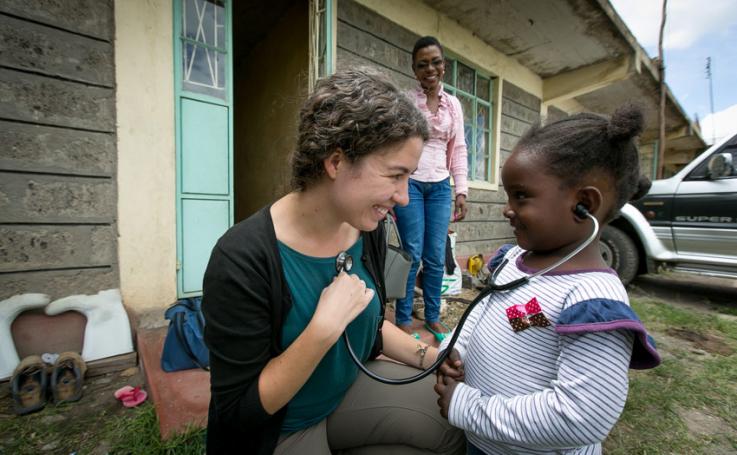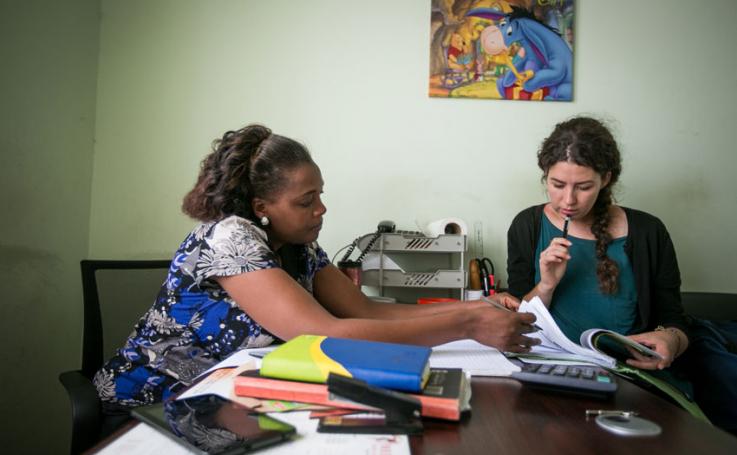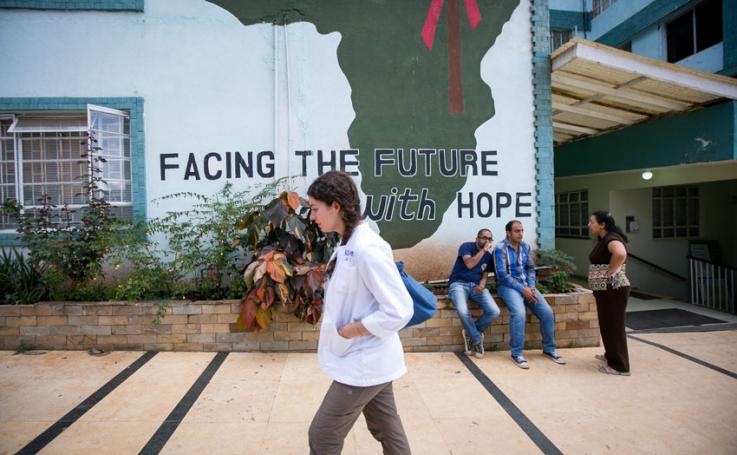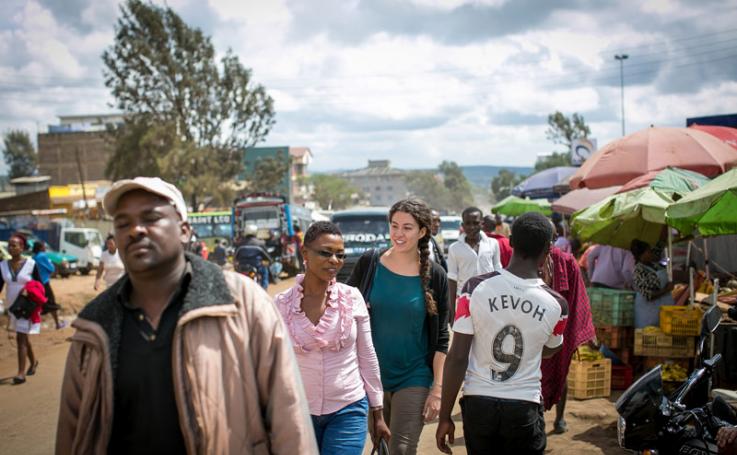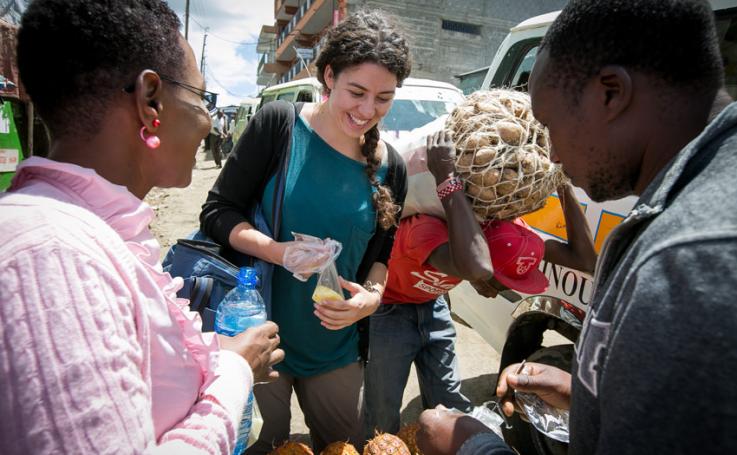What interested you in global health? Was there a specific event or experience in your life that catalyzed your interest?
It's difficult to separate my interest in medicine and my interest in global health, because medicine has long been my planned role within the global health field. However, I can trace my first real global health experience to 2008. As an undergraduate student, I studied abroad in Puebla, Mexico and participated in an internship that allowed me to shadow physicians in several local hospitals. This was my first experience with global health work, and allowed me to see how different health systems served patients. It was also an alarming introduction to the role that privilege plays in healthcare - I was often assumed to know more than the little I did. My interest piqued, I vowed to learn more - and to work hard to learn responsibly. Since that experience, I've been fortunate to participate in on-site research, community health programming, and clinical work in several locations in Tanzania, Uganda and Kenya, for a total of about one out of the last five years.
I was drawn to the field of medicine because it combines several of my passions and interests: care for the underserved, the intersection of storytelling and science, humanistic aspect of medicine, and recognizing the patient's role as teacher. Global health is a natural complement to these interests.
What kinds of hands-on experience did you complete to fulfill your requirements for the Pathway?
I participated in GHIP (Global Health Immersion Program) during the summer between my first and second year of medical school, in Naivasha, Kenya. My project involved working with community health workers (CHWs) to generate a continuing education program, driven by the interests of the CHWs and health needs of the local community. In the process, I learned a great deal about the challenges faced by CHWs within Kenya's multilevel healthcare system, particularly in the setting of abject poverty. This project later took me to the Western Regional Medical Student Forum, for oral presentation of my results.
In my second year of medical school, I participated in UWSOM's Global Health Group. As part of GHG, I served on the committee for the 2014 Western Regional International Health Conference, and led a subcommittee for breakout sessions focusing on the intersection of technology and gender. I can't say I would have found my way to this opportunity if not for GHG, and I found it truly rewarding and unique.
In my fourth year of medical school, I participated in the GHCE (Global Health Clinical Elective) in Uganda. I spent four weeks on the wards at the national hospital in Kampala, as part of the medical team, participating in patient care, and learning about Uganda's healthcare system. I spent the remaining two weeks of this six-week elective in Kayunga, Uganda, a small town several hours from Kampala. There I worked in the district hospital, again helping to take care of patients, and witnessing firsthand the efforts of a dedicated group of Ugandans to care for patients while efficiently utilizing incredibly limited resources. Water, electricity, basic medications and IV start kits were occasional luxuries, not guaranteed supplies.
After a few weeks of backpacking (I spent Match Day on the border of Rwanda and the Democratic Republic of the Congo!) it was on to Nairobi, Kenya for the GHIV (Global HIV) elective. During this six week elective I learned more about HIV medicine than I had learned so far in medical school. I also learned about the stigma of HIV, the challenges of ensuring access to antiretrovirals, and the enormous value of clinical officers (Kenya's midlevel providers) in providing excellent care to a vulnerable population. My rotation incorporated time on the wards, in adult and pediatric HIV clinics, in antenatal support groups, and making house calls with the outreach team.
How did you manage to fit in the GH Pathway requirements with your regular medical school load?
The GH pathway incorporated the preclinical and clinical elements I was already interested in, and provided guidance and inspiration to stay connected to these interests. I never felt that the pathway requirements were a burden. Rather, they encouraged me to explore opportunities I found incredibly enriching.
What did you find most rewarding about the GH Pathway experience?
While I definitely appreciated the longitudinal aspect of the GH pathway, I most enjoyed my clinical rotations in Uganda and Kenya. Being able to spend more than four months of my last year of medical school living abroad, and learning from talented physicians, nurses, and medical students, was an unbelievable experience. It solidified my interest in global health clinical work. The breadth of clinical opportunities offered by GHCE in particular is impressive.
What was most challenging about your experiences working in Kenya?
The last few months of medical school are an awkward time of transition for any medical student. Truly, not much changes in the learner between these few months and the beginning of residency, except that we are suddenly (nascent) physicians charged with new responsibility and slightly less oversight. In my rotations in the US, I always felt closely supervised and only rarely was I asked to do things out of my comfort zone - and someone else was usually available to take over if I felt out of my depth. In Kenya and Uganda, I was often faced with requests to perform tasks beyond my training, and I was well aware that my position as a privileged outsider played a heavy role in this. For me, the most difficult aspect was deciding how to act, to minimize harm in my role as a learner, recognizing that I did have clinical knowledge to share but that I needed to be very cautious in how I did so. I decided before I left for Uganda that if a task wasn't something I would safely do at home, I shouldn't do it abroad. I take the "first do no harm" aspect of medicine very seriously, and there wasn't much of a safety net with respect to medical student autonomy, so I had to be proactive about my decisions to engage in or decline clinical experiences. It has always been my view that the more vulnerable the patient, the more cautious and introspective we should be when it comes to our own learning at the patient's potential expense. Not all, but most, of the patients I met in Kampala, Kayunga and Nairobi were underserved, and I felt this fact merited extra caution on my part. So, discerning my role in their care was easily the most challenging aspect of my time there.
How has your experience in the Pathway influenced your current work and future career goals?
Family medicine encompassed everything that brought me to medicine in the first place, and is a natural fit for global health work - something that became very clear during my time in the GH pathway. I chose a residency program that values both academic and community medicine, within a large refugee and immigrant community, to ensure continued connection to the global health arena. I am strongly considering pursuing locum tenens (temporary placements for physicians) in an underserved community, possibly in east Africa, for at least some time upon completing my residency. If I anticipate that obstetrics will be a large part of my future practice, I will likely also consider an OB fellowship, which would allow me to provide expanded care to pregnant patients.
Zoë Cross, MD is an Intern Family Medicine Resident in the Department of Family & Preventive Medicine at the University of Utah School of Medicine.
Interview date: 10/19/2016
